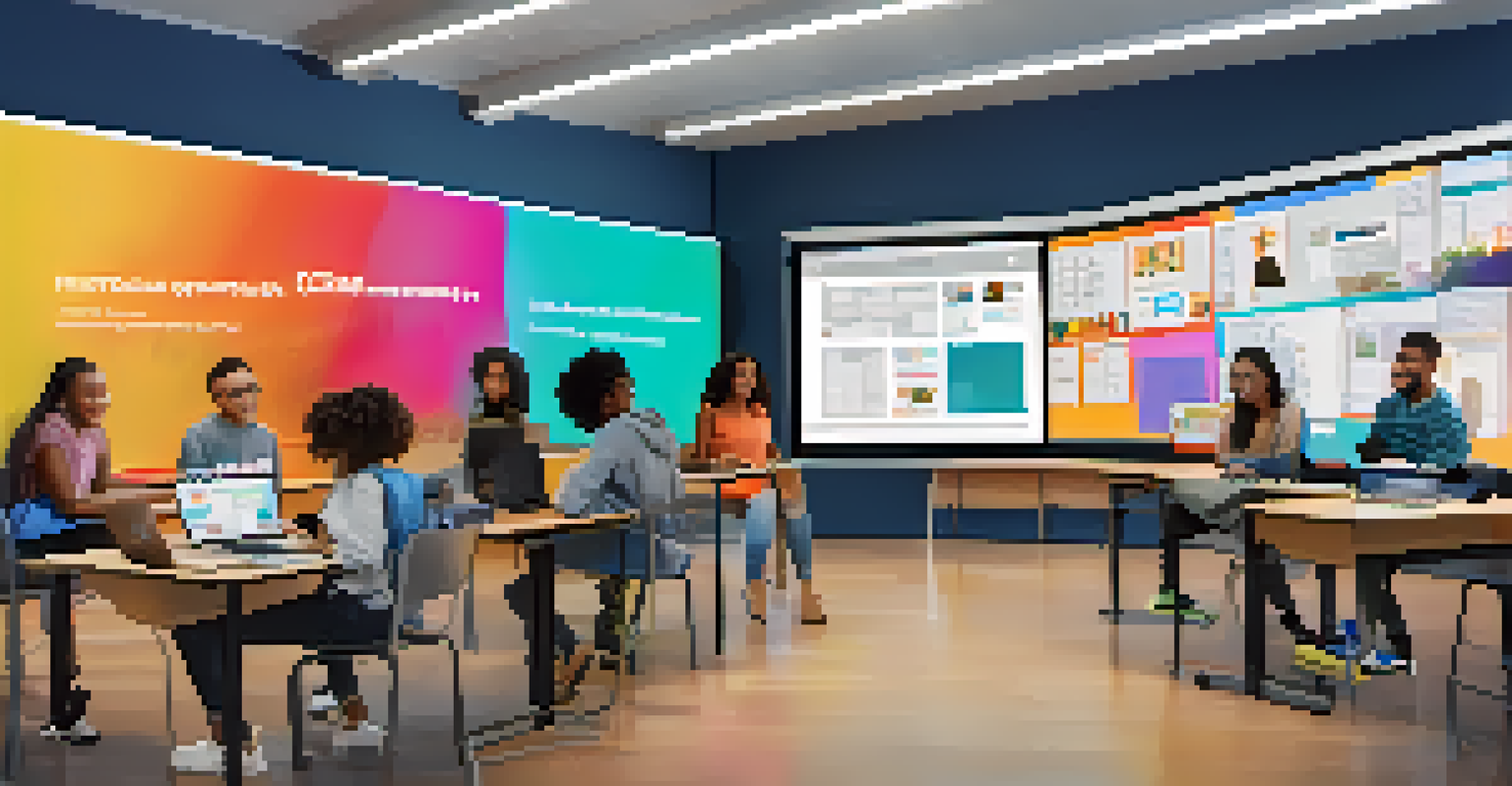The Role of Testimonials in Assessing Online Learning

Understanding the Value of Testimonials in Education
Testimonials play a crucial role in the online learning landscape. They provide insights from real learners, offering a glimpse into the experiences and outcomes of a course. This firsthand feedback can often be more persuasive than traditional marketing materials, helping prospective students make informed decisions.
Testimonials are the bridge between a prospective learner's uncertainty and the confidence of those who have gone before them.
When considering an online course, potential students frequently seek validation from others who have walked the same path. A glowing testimonial can ease doubts and build trust, making the decision to enroll feel less risky. Essentially, testimonials serve as a bridge connecting the uncertain prospective learner to the confidence of past students.
Moreover, testimonials can highlight specific strengths of a course that may not be evident in course descriptions. Whether it’s the quality of instruction, the effectiveness of the curriculum, or the supportive community, these personal stories can illuminate what makes a program truly special.
How Testimonials Influence Decision-Making
In today’s digital age, most decisions are influenced by reviews and testimonials. When individuals are faced with numerous online learning options, they often look for reassurance from those who have previously enrolled. A well-crafted testimonial can be the catalyst that prompts a prospective student to take the plunge.

Consider the analogy of a restaurant; diners often rely on reviews to gauge the quality of food and service. Similarly, testimonials act as recommendations from peers, giving potential learners a sense of credibility and reliability. This social proof is powerful, especially when students are investing time and money into their education.
Testimonials Build Trust and Credibility
Testimonials provide validation and reassurance for prospective students, helping them feel more confident in their course choices.
Furthermore, the emotional connection created through testimonials can be compelling. Hearing a story of transformation or success can inspire potential students to envision their own success, increasing the likelihood of enrollment.
Types of Testimonials: Authenticity Matters
Not all testimonials are created equal; their authenticity can significantly impact their effectiveness. Genuine testimonials, often featuring specific details about the learner's journey, resonate more with prospective students. These authentic narratives create a sense of relatability and trust.
Authenticity is the key to building trust; without it, testimonials can fall flat and lose their impact.
On the other hand, overly polished or generic testimonials can raise skepticism. Learners may question whether the feedback is real or simply marketing hype. It's essential for institutions to encourage honest feedback, as real stories often lead to deeper connections.
Incorporating diverse voices in testimonials can further enhance credibility. By showcasing testimonials from various backgrounds and learning experiences, potential students can see themselves reflected in the stories shared.
The Role of Platforms in Showcasing Testimonials
The platforms where testimonials are displayed can significantly influence their impact. Whether on a course website, social media, or third-party review sites, the visibility of testimonials matters. A well-placed testimonial can catch the eye of a prospective learner and sway their decision.
Additionally, integrating testimonials into the learning experience itself can enhance their effectiveness. For example, featuring testimonials in course previews or welcome videos can create a welcoming atmosphere, encouraging enrollment. This strategy not only highlights positive experiences but also fosters a sense of community.
Authenticity Enhances Effectiveness
Genuine testimonials with specific details resonate more with potential students and foster trust, while generic feedback can raise skepticism.
Moreover, platforms that allow for interactive testimonials, such as video or audio formats, can engage potential students on a deeper level. These formats provide a more personal touch, allowing prospective learners to connect emotionally with the stories shared.
Leveraging Testimonials for Course Improvement
Testimonials serve a dual purpose; they not only assist prospective students but also provide valuable feedback for course developers. Analyzing the content of testimonials can reveal strengths and weaknesses within a program. This insight can guide continuous improvement efforts, ensuring that courses meet the evolving needs of learners.
For instance, if multiple testimonials mention the desire for more interactive content, course designers can consider implementing changes to enhance engagement. This responsiveness to feedback demonstrates a commitment to quality education and student satisfaction.
Furthermore, using testimonials as a feedback tool can foster a culture of openness and growth within the learning environment. When students see that their voices matter, they are more likely to engage and provide constructive feedback.
The Ethical Considerations of Using Testimonials
While testimonials can be highly beneficial, ethical considerations must not be overlooked. Ensuring that testimonials are voluntary and accurately represent the learner's experience is paramount. Misleading or fabricated testimonials can damage credibility and trust.
Transparency is key; institutions should disclose how testimonials are collected and used. By being upfront about the process, organizations can build trust with both current and prospective students, reinforcing their commitment to integrity.
Feedback Fuels Course Improvement
Testimonials not only guide prospective students but also offer valuable insights for course developers to enhance educational offerings.
Additionally, offering students the opportunity to provide feedback without pressure can yield more honest and constructive testimonials. This approach not only enhances authenticity but also ensures that the voices of all learners are heard.
Future Trends: The Evolution of Testimonials in Online Learning
As online learning continues to evolve, so too will the role of testimonials. With advancements in technology, we may see more interactive and multimedia testimonials that engage potential students in new ways. Virtual reality experiences or video testimonials could become commonplace, offering immersive insights into the learning experience.
Moreover, as artificial intelligence becomes more integrated into education, personalized testimonials based on user preferences could emerge. Tailoring testimonials to align with individual interests could enhance their effectiveness and relevance.

Ultimately, the future of testimonials will likely focus on authenticity and engagement. As learners become increasingly discerning, institutions that prioritize genuine feedback and innovative storytelling will stand out in the crowded online education marketplace.